The IURC Asia-Australasia programme launched its fourth kick-off meeting in the Asia-Australasia region on 17 July 2025, this time with Malaysian pilot cities: Seberang Perai, Penang (a graduate city) and Iskandar Regional Development Authority, Johor (a newcomer city).
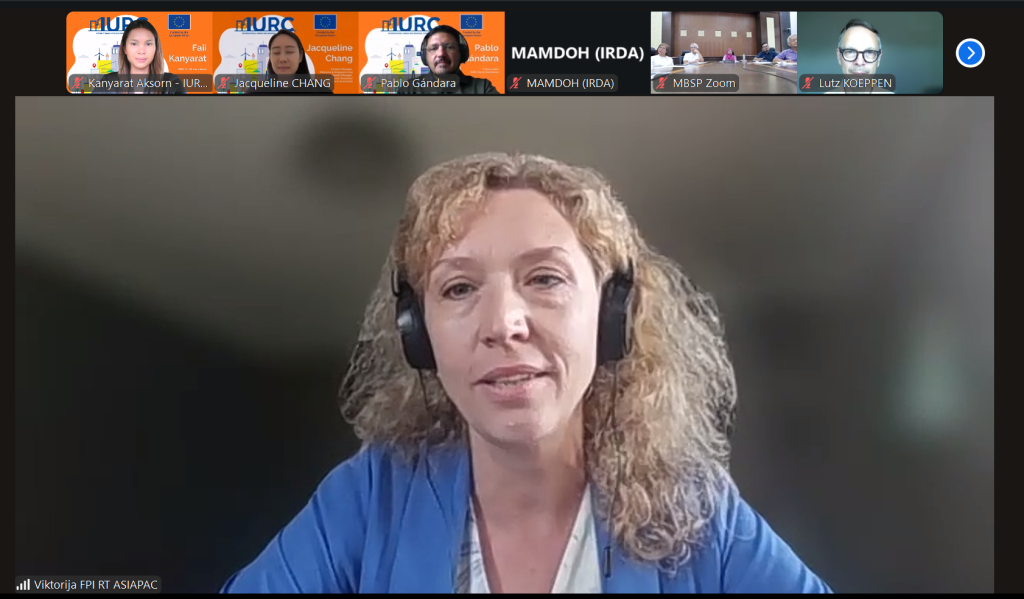

Ms. Viktorija Kaidalova, representing the EU Service for Foreign Policy Instruments (Regional Team for Asia and the Pacific), outlined the programme’s goals during her opening remarks, emphasising its focus on sustainable urban development, climate mitigation, and climate adaptation through city-to-city cooperation.
Mr. Lutz Köppen (REGIO.03 – Cities, Communities, People) representing the European Commission – Directorate-General for Regional and Urban Policy (DG REGIO), expressed enthusiasm for the collaboration and highlighted the programme’s global scope during his welcoming address, including partnerships in Asia and the Pacific.
As part of the EU-Malaysia component, the kick-off meeting marked the first official engagement of the participating pilot cities from Johor and Penang with experts from the European Union. The meeting was designed to initiate connections, provide a preliminary orientation to the IURC programme, and build a shared understanding of its long-term vision and goals.
Objectives of the kick-off meeting
The meeting served as a platform for the pilot cities to:
- meet and share their aspirations, share their collective six (6) pilot projects and potential areas they would like to strengthen their urban and regional cooperation with European cities in specific thematic cluster networks.
- generate better understanding of what the EU-Malaysia city-to-city cooperation hopes to achieve.
- ask questions to align thoughts on the targeted focused areas of cooperation.
- receive advice from European counterparts, to manage expectations of the Malaysian cities – what to expect, how IURC Asia-Australasia facilitates this process.
Overview of the IURC Programme
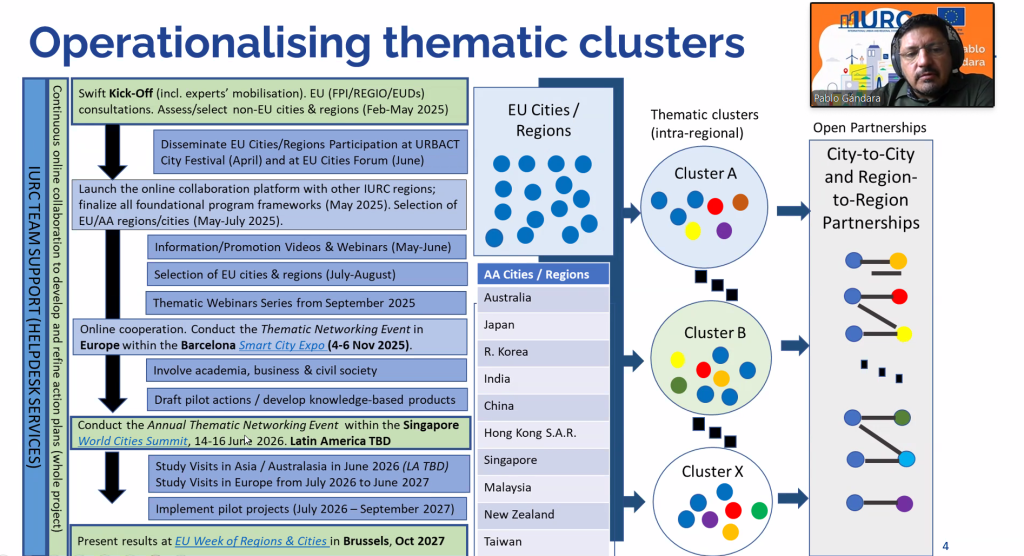
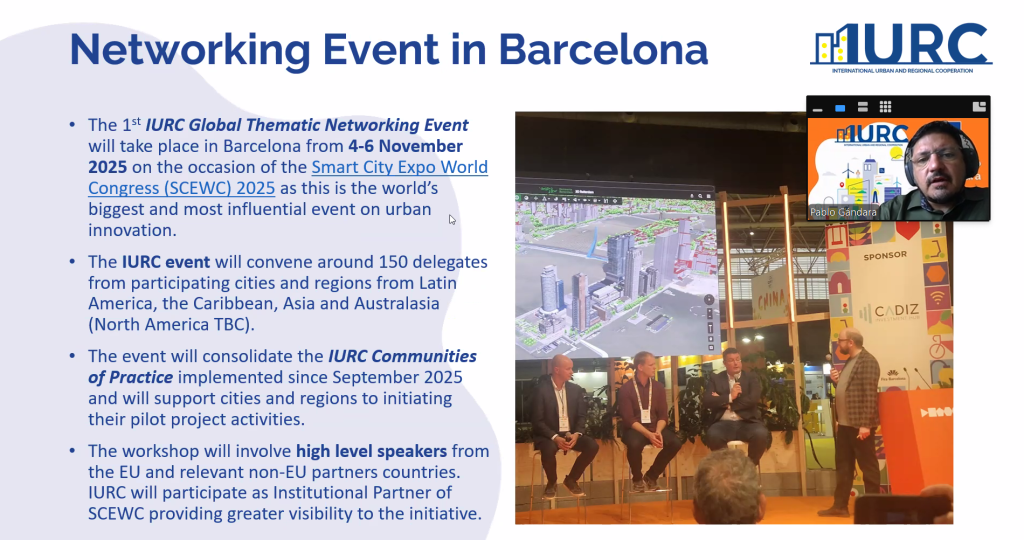
Mr. Pablo Gándara, Team Leader of the IURC Asia-Australasia programme provided an introduction outlining the groundwork for an effective and impactful cooperation journey under the IURC framework. He shared a detailed overview of the programme’s structure and next steps, with the aim of fostering meaningful urban partnerships and addressing urbanization challenges. Then, he outlined the cooperation scheme in detail for the next three years, including the selection of European cities and regions, thematic cluster cooperation starting in September, and events in Barcelona (2025), Singapore (2026) and Brussels (2027). He also emphasized the importance of shared priorities and mutual learning in pilot projects and mentioned the launch of a competitive fund in 2026 to support implementation of these projects.
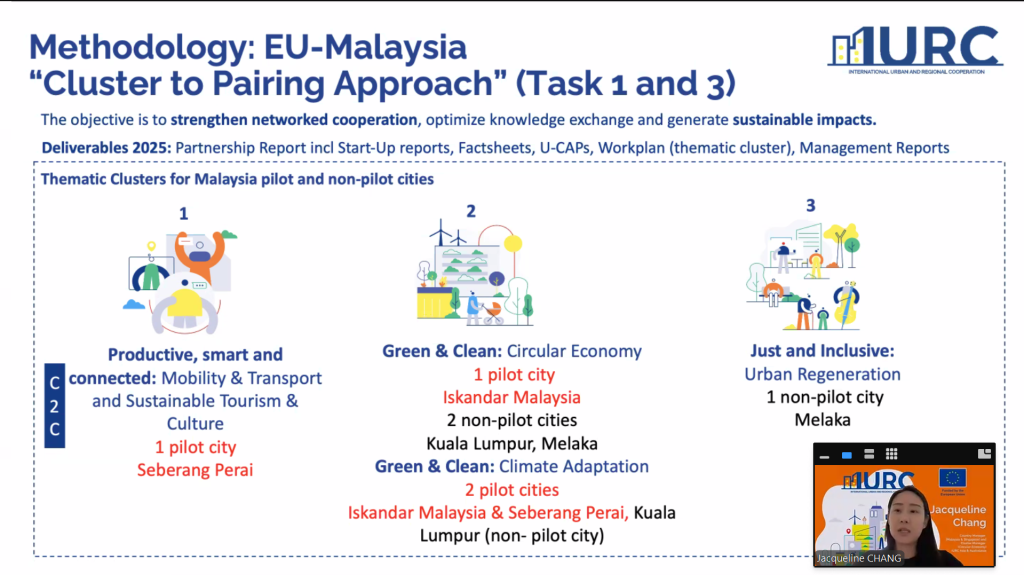
Malaysian Pilot Cities Strategic Focus
Ms. Jacqueline Chang, Country Manager for Malaysia & Singapore presented the thematic focus networks and sectors for Malaysian pilot and non-pilot cities, highlighting Seberang Perai’s choice on Productive, Smart, and Connected Networks focusing on mobility and transport, sustainable tourism, and culture, while Iskandar Malaysia, Melaka and Kuala Lumpur focus on Green and Clean initiatives (circular economy and climate adaptation). Melaka has also chosen urban regeneration under the Just and Inclusive network.


Iskandar Regional Development Authority represented by Mrs. Kamisah Mohd Ghazali, Head for Resilient Environment together with her team members introduced Johor-Singapore Special Economic Zone (JS-SEZ), emphasizing its strategic location, population, and flagship zones across seven out of eleven (7/11) economic sectors of the JS-SEZ (logistics, manufacturing, digital economy, tourism, food security, energy and green economy), with a focus on sustainability and investment opportunities that strengthen EU-Malaysia trade and investments. She highlighted four (4) proposed pilot projects focusing on the Green and Clean Thematic Network on Climate Mitigation (2 projects) and Climate Adaptation (2 projects). They are:
- Circular Economy Park (CEP): infrastructure development to improve circular economy solutions in Iskandar Malaysia
- Iskandar Malaysia Circular Economy Network App (IMCENA) : a digital platform for circular economy acceleration and industrial symbiosis
- Multi-hazard platform (MHP) for forecasting local level climate extremes and physical hazards in Iskandar Malaysia
- Water Sensitive Urban Design (WSUD) in new development zones
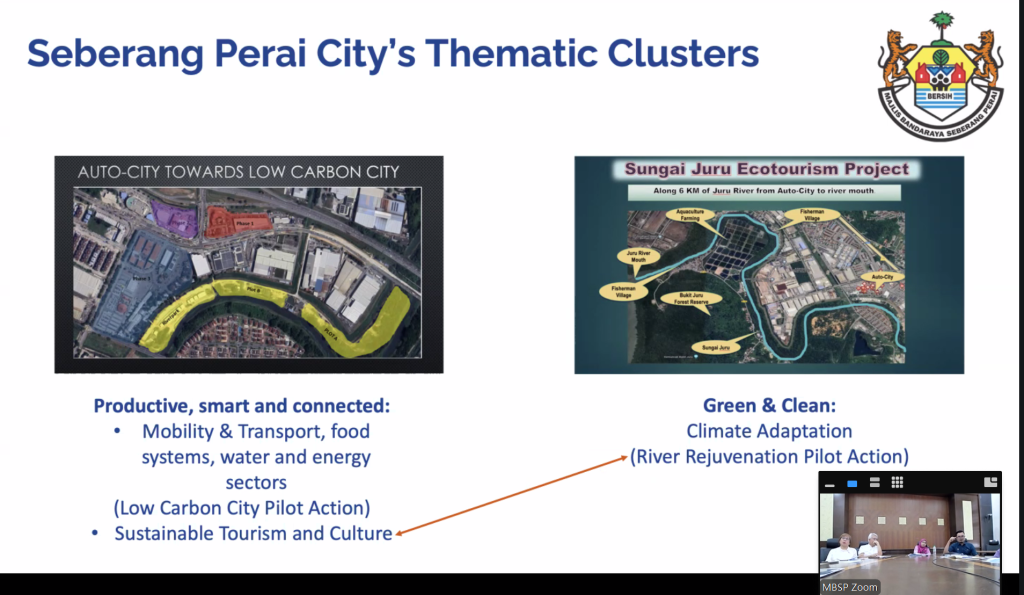
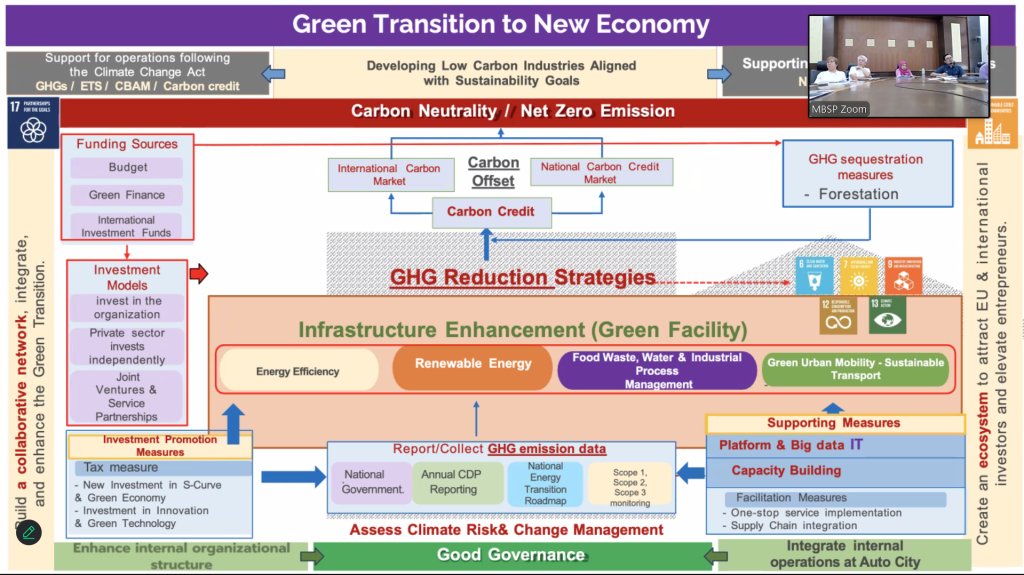
Seberang Perai City Council (MBSP) represented by Mrs. Amira binti Ahmad, Head of Assistant Director Corporate Department appointed Mr. Chew Eng Seng, Head of Education & Promotion Environment Unit and Mr Mohd Nizam bin Abu Bakar, Assistant Urban Town Planning Officer, Urban Services Department to deliver the presentation.
MBSP presented two main projects focused on the Productive Smart and Connected Network: Auto City’s sustainability initiatives and the Green and Clean Thematic Network on Climate Adaptation: Juru River Rejuvenation and Ecotourism project. Mr Nizam Bakar reported that Auto City has implemented various green measures in the energy sector (renewable energy & energy efficiency), wastewater treatment, circular waste management, green urban mobility and creation of green spaces. Mr. Chew Eng Seng explained that the Juru River Rejuvenation project aims to transform 6 kilometres of riverbanks and surrounding areas into an ecotourism destination, focusing on biodiversity conservation and local community development. Both projects seek international cooperation and funding to achieve their sustainability goals, with specific targets related to Penang’s Green Transition to New Economy and strengthening nature-based solutions with guidance from IUCN Global Standard for Nature-based Solutions criteria and guided by global frameworks such as European Commission’s Nature-based Solutions Impact Assessment Framework.
European-Malaysian Urban Learning Initiative
During the interactive discussion, the cities reflected on past collaborations with European counterparts, including experiences with Japan and Portugal, and expressed interest in exploring future partnerships with cities in Denmark, the Netherlands and Germany. Seberang Perai noted that under the previous IURC Asia-Australasia Phase (2021-2023), it had signed two MOUs directly with Maia and Vila Nova de Famalicão (Portugal), is a signatory to the Milan Urban Food Policy Pact and has benefited from related technical workshops. The discussion underscored the value of sharing best practices and expertise, with particular interest in the multi-hazard platform and capacity building for local authorities.
Ms. Viktorija Kadailova stressed the importance of mutual learning and practical outcomes. Mr. Lutz Köppen introduced the European Urban Initiative (EUI) as a platform for further collaboration, drawing inspiration from the Urban Agenda for the EU Thematic Partnerships related to the topics discussed—such as water sensitive cities, sustainable food systems, and food security—and invited the pilot cities to apply this know-how in their collaborative projects with EU cities. As a result, the pilot cities had the opportunity to align expectations, explore scaling strategies, and begin collaborating on their target areas for cooperation.
Mr. Pablo Gándara introduced a peer-to-peer learning initiative between European and Malaysian cities, outlining monthly thematic cluster knowledge-sharing sessions, while Ms. Jacqueline Chang spoke of masterclasses for high-demand topics. Mr. Gándara emphasized the need for tangible outcomes from city collaborations, citing a previous pilot project between Melaka and Bologna. He outlined key next steps for Malaysian cities, including joining monthly national coordination meetings, identifying representatives for the Barcelona Smart City Expo, and developing an Urban Cooperation Action Plan (U-CAP) by February 2026.
H.E. Rafael Daerr, Ambassador of the European Union to Malaysia and Head of the Delegation of the European Union to Malaysia, expressed in his letters congratulating the Mayor of Seberang Perai and Chief Executive of IRDA that the city-to-city cooperation would achieve the following:
“We believe the multi-pronged approach focusing on climate actions, trade and investments throughout the programme will produce win-win outcomes for everyone.”
The kick-off meeting concluded with appreciation for all the attendees and the valuable inputs shared with the cities. We would like to thank the following individuals who were also present at the meeting: Ms. Kanyarat Aksorn, Project Assistant, IURC Asia-Australasia; and from the private sector, Mr. Gary Teoh Kiang Hong, Managing Director, and Madam Ong Bee Lee, Director of Auto-City, Penang. Their support since the start of the IURC Asia-Australasia programme (2021–2023) has been greatly appreciated.
The new phase of the International Urban and Regional Cooperation Asia & Australasia (IURC AA) is taking shape. Iskandar Regional Development Authority and Seberang Perai (pilot cities), together with Kuala Lumpur and Melaka (non-pilot cities participating in online knowledge-sharing sessions), and alongside peers from Japan, the Republic of Korea, Malaysia, Australia, New Zealand, India, the People’s Republic of China, Hong Kong, and Taiwan, have been successfully selected under the EU-funded IURC Asia-Australasia programme.
We are pleased to announce that 30 EU and 30 Asia–Australasia cities, along with 12 EU and 11 Asia–Australasia regions, have qualified for the 2025–2027 phase.
For further information on EU–Malaysia urban and regional cooperation, please contact: Ms. Jacqueline Chang, Country Manager for Malaysia and Singapore | Cluster Manager for Circular Economy, at jchang@iurc.eu.
